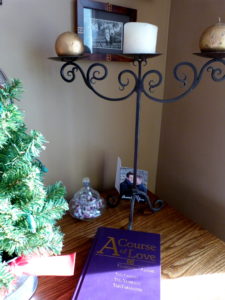
Who I Am to you, and who you are to me, is all that matters. Our relationship can only be thus in union and relationship with each other because we are in union and relationship with each other. We are not two beings who are separate but relating in union. We are each other’s own being. We are one and we are many. We are the same and we are different. In “own”-ership we are full of one another’s own being. We are each other’s own.
Day 38.13
“We are each other’s own.”
In Finding Grace at the Center, a book about The Beginning of Center of Prayer, it is said that the Greek Bible “used the word gnosis to translate the Hebrew word da’ath, a much stronger term which implies possession of the thing known, an extremely intimate kind of knowledge involving the whole person, not just the mind.” The word da’ath is further described as “the kind of experiential knowledge that comes through love.” *
“Experiential knowledge that comes through love.”
This could be one of the best ways I’ve seen of expressing what comes of the new way of knowing that is A Course of Love.
Since I wrote of “possession” last week, it has stayed with me, which I’m sure is is why this quote suddenly revealed itself. This week “possession” expanded into an idea much like taking possession of a new home, or in this case our “true home,” and a birth that takes place in each of us as this new home is revealed:
This alchemical transition, this passing of the unknown into the known, this moment when the unknown becomes the known within the Self, is the birth of creation. It is the culmination of all that has come before, the All of Everything realized in a single heartbeat, a single instant of knowing. This is the One Self knowing itself. This is not knowing that comes with a great ah ha, but knowing that comes with the awe of reverence. Creator and created are one and the homecoming experienced is that of union. (D:Day 26.7)
The homecoming experienced is that of union.
I love it when “means and ends” come together. Also in The Dialogues, Jesus asks how we could possibly “know” anything from which we are separate and says this is why this Course has had, as its main objective, returning us to true knowing of our selves. (D:Day 37.17) When we know ourselves we know God. When we know God we know ourselves. And then . . . we know ourselves together, as one, in union.
In my home, putting out the manger, this first “home” to Jesus, is a Christmas tradition. Behind it, we’ve placed a metal sculpture that portrays the riches that might have been near but far distant from this place of exile. We still live in a world where riches at times seem to stand apart from our God-given holiness, but humanity’s holiness and belovedness is still there. A realization or deepening of this “knowing” is my prayer for you during this season that can “get away from us” or . . . can bring us home to love.
All that you have experienced in truth is love. (T1:1.5)
- Finding Grace at the Center, by M. Basil Pennington and Thomas Keating (p. 62)

